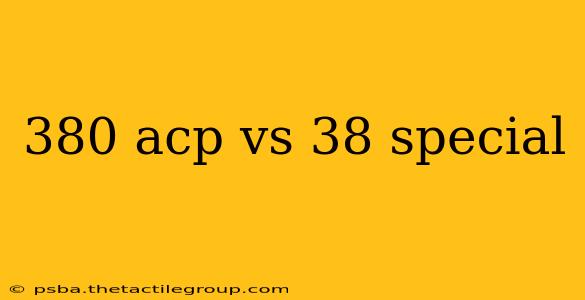Choosing the right cartridge for self-defense or target practice can be a daunting task, especially when comparing seemingly similar rounds like the .380 ACP and the .38 Special. While both are pistol cartridges, they differ significantly in size, power, and application. This in-depth comparison will help you understand the key differences and decide which cartridge best suits your needs.
Caliber and Dimensions: A Size Comparison
The most obvious difference lies in their physical dimensions. The .380 ACP (Automatic Colt Pistol), also known as 9mm Kurz, is a smaller, more compact round designed for smaller, easier-to-conceal pistols. The .38 Special, on the other hand, is a significantly larger cartridge, traditionally used in revolvers but also found in some semi-automatic pistols. This size difference directly impacts the power and recoil characteristics of each round.
Ballistics: Power and Recoil
The .38 Special delivers considerably more stopping power than the .380 ACP. This is primarily due to its larger size, allowing for a heavier bullet and a larger powder charge. The .38 Special boasts significantly higher muzzle energy and velocity, leading to greater penetration and a wider wound channel. However, this increased power also translates to greater recoil, making it potentially less manageable for individuals with less shooting experience or smaller physiques.
The .380 ACP, while less powerful, offers a more manageable recoil, making it suitable for smaller-framed shooters and concealed carry. Its lighter recoil allows for quicker follow-up shots, a crucial factor in self-defense situations.
Key Ballistic Differences (Approximate Values, Variations Exist Based on Specific Ammunition):
| Feature | .380 ACP | .38 Special |
|---|---|---|
| Bullet Weight | 90-100 grains | 125-158 grains |
| Muzzle Velocity | 900-1100 fps | 750-1000 fps |
| Muzzle Energy | 150-200 ft-lbs | 200-400 ft-lbs |
| Recoil | Lower | Higher |
Ammunition Availability and Cost
Both .380 ACP and .38 Special ammunition are readily available, but the .38 Special often enjoys a slight edge in terms of variety and potentially lower cost per round, especially in bulk purchases. However, prices fluctuate depending on market conditions and manufacturer.
Applications: Self-Defense vs Target Practice
The choice between .380 ACP and .38 Special often hinges on the intended use.
Self-Defense: The .38 Special's higher stopping power makes it a more potent self-defense round. However, the increased recoil might hinder accuracy and rapid follow-up shots, especially under stress. The .380 ACP, while less powerful, offers better concealability and manageable recoil, making it a viable option for concealed carry, particularly for those prioritizing ease of use and control.
Target Practice: Both calibers are suitable for target practice. The .38 Special's larger recoil can be valuable in honing shooting technique, but the .380 ACP's lower recoil is better for practicing rapid firing and developing smoother shooting habits.
Conclusion: The Right Choice Depends on Your Needs
Ultimately, the best cartridge depends on individual needs and preferences. The .38 Special offers superior stopping power and penetration but comes with greater recoil. The .380 ACP provides manageable recoil, greater concealability, and is easier to handle for smaller shooters, but sacrifices some stopping power. Consider your physical capabilities, intended use (self-defense, target practice, etc.), and comfort level when making your decision. Consult with experienced firearms instructors and professionals before making a final choice.

